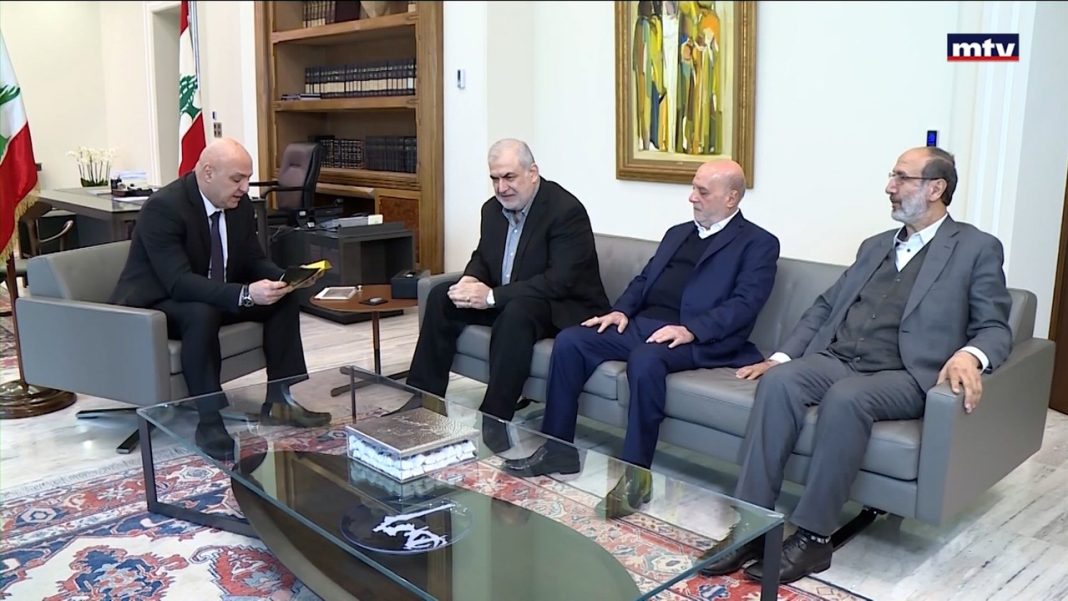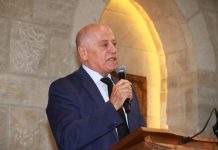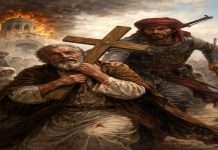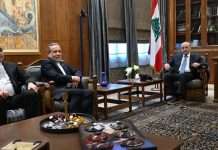A Final Plea to President Joseph Aoun: Act Before It’s Too Late – Or Say Farewell to Lebanon
Colonel Charbel Barakat/May 17, 2025
صرخة أخيرة نرفعها للرئيس جوزيف عون الذي تأمل فيه الكل بان يقدم ولا يضيّع آخر الفرص، وإلا وداعاً لبنان
الكولونيل شربل بركات/17 أيار/2025
*مطلوب من الرئيس ألا يتوهّم بما يقال له من قبل مستشارين أفشلوا غيره وضيّعوا لبنان عدة مرات في السابق، لا بل لطّخوا صورته بنظرياتهم الفاشلة.
*السيدة أورتيغاس قادمة مجددا، وقد يكون لآخر مرة، لكي تفهم من في سدة الحكم بأنهم لم ينجحوا بعد في الاختبار، ولذا فهم سيكونون خارج اللعبة القادمة.
*هل انتهى شهر عسل لبنان جوزيف عون ونواف سلام قبل أن يبدأ؟ وهل سنعود إلى حروب الطوائف بالرغم من المهادنة بين الأنظمة الكبرى؟
*ليشد الرؤساء ركبهم، وليعمدوا أولا وقبل أي شيء، لفرض سلطة الدولة، لا بالتراضي بل بالوهرة، ومن ثم يمكن تصحيح بقية الأمور.
*على الدولة أن تعلن بأنها ستحاكم كل مسؤول عن التسبب بالحرب، ثم تبدأ باستدعاء كل من تسوّله نفسه التطاول على الدولة أو القانون.
*لا يبدو الحكم في لبنان بأنه جاد بفرض احترامه خاصة بمجال جمع السلاح، وكأنه يتخلى عن صلاحياته ويجيّرها لعصابات الفوضى والتخريب.
*مهما كانت العقبات التي تواجه الرئيس حتى في الصلاحيات، فالمطلوب منه والمرتجى أن يبادر لدفع البلاد نحو السلم الداخلي بفرض سلطة الدولة بالقوة لكي يهابها الكل وينتظم بتنفيذ قراراتها.
أعتقد البعض بأن وقف اطلاق النار والمطالبة الدولية بتنفيذ القرار 1701 بكل مستلزماته سيخلّص لبنان من المليشيات وأسلحتها ونفوذها المتمدد داخل الدولة، وبأن الرئيس الجديد، الذي انتخب ليتحمل القرار ويحسم الوضع نهائيا بالمساندة الدولية اضافة إلى دعم أكثرية اللبنانيين، الذين رأوا بأم العين سيطرة وتحكّم المليشيات المأجورة وتسبّبها بقتل آلاف المواطنين وتدمير بيوتهم وتشريدهم من قراهم، لن يتراجع وسيبادر إلى وضع جدول زمني لتسلّم كافة الأسلحة من حزب إيران وغيره من المليشيات، ومن المخيمات الفلسطينية وكافة البؤر الأمنية الممنوعة على الدولة والتي تسرح فيها عصابات التهريب ومجموعات الخارجين عن القانون، حتى ولو استلزم ذلك استعمال القوة. ولكننا صدمنا، منذ اختيار الرئيس لمستشاريه وبالتالي رئيس الوزراء الذي لم يتجرأ على تعيين واحد من المواطنين الشيعة الأحرار من خارج الثنائي الذي دمر البلد، وإذا بنا نسمع مجددا اجترار المواقف التي أتحفنا بها الحزب قبل الحرب وعلى لسان من تبقّى من زعمائه، لا بل حتى من رئيس المجلس وبعض المعممين التابعين له، وكأن شيئا لم يحدث ولا دمرت القرى والأحياء ولم نتعظ من القرارات التي أودت بالطائفة إلى المصير المشؤوم.
لقد أخذ الرئيس وحكومته وهجا من قبل المجتمع الدولي بناء على خطاب القسم والوعد بتنفيذ القانون بدون مواربة، ولذا بدأنا نرى اهتمام العواصم والمحافل الدولية بلبنان ورئيسه، والذي لم يدم طويلا بسبب التراخي بقضية جمع السلاح والكلام على التفاوض، ما أجهض القرار وأعطى المجال لمليشيات جديدة من الجماعة الاسلامية إلى حماس وغيرها للبدء بتحضير مقارعة الدولة والسيطرة على الشارع، خاصة وأن الجار السوري أصبح اقرب إلى الدخول في العملية السلمية واعادة تنظيم الشرق الأوسط برعاية سعودية – تركية تبدو مقبولة اميركيا، وهو الذي عنده الكثير من المتطرفين والخارجين عن القانون الذين يمكن ارسالهم إلى لبنان للتخلّص من ازعاجهم بدون الكثير من الجهد. فهل انتهى شهر عسل لبنان جوزيف عون ونواف سلام قبل أن يبدأ؟ وهل سنعود إلى حروب الطوائف بالرغم من المهادنة بين الأنظمة الكبرى؟
الدولة صاحبة القرار هي وحدها من يلغي التطرّف واستعمال السلاح والمتاجرة بفلسطين وغيرها من القضايا، ومن هنا على لبنان الحكم أن يكون قادرا؛ أولا على فرض هيبته داخليا وتفرده باستعمال القوة والعنف، وعدم تهديد أي من المركبات بقدرته على مواجهة الدولة في هذا المجال. ومن هنا ضرورة التحكّم بكل وسائل العنف وجمع كافة الأسلحة التي تعيق الحكومة وقواتها من فرض القانون تحت أية ذريعة. فلا وطن بدون دولة قادرة ولا دولة بدون هيبة للقانون والسلطة. فليشد الرؤساء ركبهم، وليعمدوا أولا وقبل أي شيء، لفرض سلطة الدولة، لا بالتراضي بل بالوهرة، ومن ثم يمكن تصحيح بقية الأمور.
السيدة أورتيغاس قادمة مجددا، وقد يكون لآخر مرة، لكي تفهم من في سدة الحكم بأنهم لم ينجحوا بعد في الاختبار، ولذا فهم سيكونون خارج اللعبة القادمة، فلا مكان للضعفاء بين صانعي القرار، ولن يقدر هؤلاء على اللحاق بقطار التطور في المرحلة القادمة، ولن ينتظرهم أحد، وسوف تتحول جهود الاعمار والتقدم والاستقرار، إلى وجهات أخرى داخل المنطقة وخارجها.
إن التحلّي بالحكمة والتروّي هي من صفات القادة عادة، ولكن ليس أولئك الذين ترزح مجتمعاتهم تحت تهديد الجماعات المسلحة الخارجة على القانون منذ خمسين سنة ونيّف. الحكمة تأتي بعد السيطرة على الحكم وفرض القانون على الجميع سواسية، وتحقيق العدالة بين الناس والمساواة في الحقوق والواجبات، وعندها تصبح الحكمة ميزة مهمة للقائد والمسؤول، أما أن يتلاعب المخربون والدخلاء والعملاء للخارج بوهرة الدولة وسيادة القانون ويتدخلون ليفرضوا ما يريدون بالقوة على الناس، فعندها تكون الحكمة نقطة ضعف لا تسهم في الوصول إلى حل بل في تعقيد الأمور ومنع الحلول.
على الدولة أن تعلن بأنها ستحاكم كل مسؤول عن التسبب بالحرب، ثم تبدأ باستدعاء كل من تسوّله نفسه التطاول على الدولة أو القانون، ولو بالكلام وحتى لو لم يصل إلى درجة التهديد، فكيف بمن يتجرأ على تعبئة الناس ضد الدولة وقراراتها، ويوهمهم بأنه لا يزال في موقع القوة والقرار؟ هذا يجب على الدولة مواجهته وسوقه مخفورا فقط لافهام الناس بأن زمنه ولّى، وبأن أحدا لن يسمح له بالتطاول على القانون أو سلطة الدولة. هنا فقط يبدأ الناس باحترام أركان الدولة، وتبدأ الدول الأخرى بأخذهم بالاعتبار. أما أن تستقيل الدولة من واجباتها وتبدأ باستجداء التأييد، فتلك أولى مؤشرات الفشل، ولن يحترم أحد من ليس بقادر على فرض احترامه بدأً برعاياه.
لا يبدو الحكم في لبنان بأنه جاد بفرض احترامه خاصة بمجال جمع السلاح، وكأنه يتخلى عن صلاحياته ويجيّرها لعصابات الفوضى والتخريب. ومن هنا لن يُقدم العالم على مساندته، لأنه يبدو غير أهلا للقيادة ولا للثقة التي منحت له. وهذه الفرصة الثانية بعد قيام اللبنانيين بمجابهة الاحتلال السوري في 2005 ما أدى يومها لتطبيق جزئي للقرار 1559 بانسحاب السوريين، والذي عاد وأجهضه تذبذب حكومة السنيورة بعد حرب 2006، حيث تهرّبت من مسؤولياتها تاركة وحش الارهاب يفترسها ليمضي اللبنانيون عشرين سنة أخرى من الاحتلال البغيض. وهم اليوم وبعد الفرصة الثانية، وبسبب تردد زعماءهم واستمرار نفس المستشارين والمنظرين بالالتفاف حولهم لخنق اي نفس تحرري عندهم ومنع أية مبادرة إيجابية لبعد النظر وصواب القرار، هاهم يضيّعون الفرصة مرة أخرى ويحجمون عن اتخاذ المبادرة؛ أولا بوحدانية السلطة، وهي تتلخص كما سبق وقلنا بفرض جمع السلاح بالقوة لاثبات الوجود وفرض الوهرة، ومن ثم بالالتحاق بقطار السلم الذي يمنع اي اعتداء على لبنان ويمنحه فرصة ملاقات العالم والمشاركة بمبادرات في مجال رسم خريطة الشرق الأوسط الجديد. فسوريا المدمرة والتي يقودها “الجولاني” وهو اسم ارتبط بالارهاب، ها هي تأخذ فرصة الالتحاق بقطار السلام وبناء الدولة ومساعدة الجميع لها. بينما يتباطأ القادة الذين لا شائبة عليهم والمشهود لهم باتخاذ القرارات، ويترددون لا بل ينسحبون من الحلبة بدون قتال ومن القيادة بدون مواجهة. ومهما كانت العقبات التي تواجه الرئيس حتى في الصلاحيات، فالمطلوب منه والمرتجى أن يبادر لدفع البلاد نحو السلم الداخلي بفرض سلطة الدولة بالقوة لكي يهابها الكل وينتظم بتنفيذ قراراتها، وبالاندفاع نحو السلم مع الجوار والذي يمنع التجاوزت والاعتداءات والتدخلات الخارجية.
لبنان، الذي شغل العالم مرة ثانية من خلال الأحداث التي وقعت فيه، هاهو يفقد الوهج لأنه لم يبادر إلى استغلال النصر على الارهاب وافهام اللبنانيين بضرورة التخلص منه، وهو يبدو وكأنه يستجديه ليسمح له بالحياة، بدل أن يكون العكس هو الصحيح. فهل سيعطي العالم فرصة جديدة للحكم؟ او هل يفهم من يجلس على الكراسي بأن الوقت يمر والفرص التي لا تستغل بوقتها تضيع؟
صرخة أخيرة نرفعها للرئيس الذي تأمل فيه الكل بان يقدم ولا يضيّع آخر الفرص أو يتوهّم بما يقال له من قبل مستشارين أفشلوا غيره وضيّعوا لبنان عدة مرات في السابق، لا بل لطّخوا صورته بنظرياتهم الفاشلة. وليكن الاقدام عنوانا لمرحلة جديدة يقودها رجل دولة يمتلك رؤية تعيد الوهج للسلطة وصلاحياتها وتطلق العنفوان من قمقم الاحقاد التي سجن فيه.
A Final Plea to President Joseph Aoun: Act Before It’s Too Late – Or Say Farewell to Lebanon
Colonel Charbel Barakat/May 17, 2025
*President Aoun must not be deceived by the advice of those around him—advisors who have failed others before him, misled Lebanon repeatedly, and tarnished even his own image with their flawed theories.
*Morgan Ortagus is returning—perhaps for the last time—to deliver a final message to those in power: they have failed the test, and as such, they will be excluded from the next chapter.
*The question looms: has the honeymoon between Lebanon, President Aoun, and Prime Minister Nawaf Salam ended before it even began? Are we on the brink of another sectarian war, even as major powers seek détente?
*The leadership must act decisively. The authority of the state must be imposed—not through consensus, but by force. Only then can Lebanon begin to correct its path.
*The state must boldly announce its intent to prosecute all those responsible for dragging the country into war and begin summoning anyone—regardless of position or rhetoric—who defies the rule of law.
*It is clear that the current government lacks the seriousness to impose its authority, especially on the matter of arms collection. Instead, it appears to have ceded its power to gangs of chaos and sabotage.
*Regardless of the obstacles he may face—even limitations on his powers—President Aoun is expected to act. He must forcefully steer the country toward internal peace by reasserting the state’s authority, so that fear of the law prevails and decisions are implemented.
Many had believed that the ceasefire and the international call to fully implement UN Resolution 1701 would finally dismantle the militias, disarm their operatives, and curb their growing influence. It was hoped that the newly elected president, bolstered by international support and the backing of a Lebanese majority weary of bloodshed, displacement, and destruction, would lead this effort without compromise.
Instead, disappointment followed. The president appointed advisors and a prime minister who refused to include even a single free Shiite voice outside the grip of the destructive dual Shia leadership. Once again, we hear the same rhetoric regurgitated by Hezbollah loyalists—the Speaker of Parliament, affiliated clerics, and others—as though nothing had happened. As though neighborhoods hadn’t been leveled and villages razed. As though lessons hadn’t been learned from the disaster that befell their sect.
President Aoun and his government received an early boost of confidence from the international community, thanks to his inaugural pledge to enforce the law without compromise. This led to renewed international interest in Lebanon and its leadership. But that attention quickly faded, as procrastination on disarmament and vague talk of negotiations replaced decisive action. This emboldened new militias—like Hamas and the Islamic Group—to begin asserting themselves, preparing to challenge the state and seize control of the streets. Meanwhile, neighboring Syria appears to be entering the peace process, backed by Saudi-Turkish coordination and U.S. endorsement. Syria, now filled with extremist remnants and wanted criminals, could easily offload its problems into Lebanon.
Has the honeymoon truly ended? Are we spiraling again toward sectarian conflict?
The state alone holds the power to eliminate extremism, end the misuse of arms, and stop the exploitation of the Palestinian and other causes. It must reassert its monopoly on the legitimate use of force. There can be no compromise. Weapons that challenge state authority must be confiscated—no matter the excuses. There can be no functioning nation without a state, and no state without the dignity of law and the supremacy of authority.
Once again, Morgan Ortagus returns to deliver a final warning: failure to act will sideline Lebanon’s leaders from the next phase. There is no room for weakness in the coming era. Reconstruction, prosperity, and strategic relevance will bypass those who hesitate.
Wisdom and restraint are valuable traits in a leader—but not in societies plagued for decades by armed outlaws. True wisdom comes after governance is reestablished, after the law is enforced, and after justice and equality prevail. Until then, what is labeled “wisdom” is merely weakness—one that emboldens saboteurs, infiltrators, and foreign agents to impose their will.
The state must immediately declare that those who instigated war will be held accountable, and those who defy the law—whether through threats or inflammatory rhetoric—will be summoned and prosecuted. The state must not tolerate anyone who incites people against its decisions, pretending they still wield authority. These individuals must be publicly confronted and escorted into custody. Only then will citizens regain respect for state institutions, and only then will other nations take Lebanon seriously.
Begging for support while relinquishing state duties is a declaration of failure. No one respects leaders who cannot impose respect, starting within their own borders.
The current government’s stance on arms collection reflects a dangerous surrender. The world has taken notice. Lebanon risks becoming irrelevant again—not due to isolation, but due to inaction. This is Lebanon’s second historic opportunity, following the 2005 uprising that led to the partial implementation of UN Resolution 1559 and Syria’s withdrawal. That momentum was squandered after the 2006 war by the indecisive Siniora government, which failed to act and allowed terrorism to fester for two more decades.
Today, Lebanon is on the brink once more. And again, it is the same failed advisors and theorists who surround the leadership, suffocating reform and preventing decisive action. Instead of reclaiming state sovereignty, they hesitate. Yet the only viable initiative now is to impose authority through the collection of arms, establish state supremacy, and join the regional peace process—one that would protect Lebanon from future aggression and restore its place at the decision-making table in the reshaped Middle East.
Even war-torn Syria, now represented by figures like “Al-Joulani”—a name synonymous with terrorism—is seeking entry into the peace train, rebuilding its state, and seeking global aid. Meanwhile, Lebanon’s leaders—known for their caution and indecision—are retreating without a fight.
Whatever the president’s challenges may be, he must now act decisively. He must restore peace by reasserting state authority, disarming militias, and pushing toward peace with neighboring states. This is the only way to prevent further aggression, infiltration, and foreign interference.
Lebanon briefly captured the world’s attention through the trials it endured. Yet it is rapidly losing its place, simply because it failed to seize the opportunity to dismantle terrorism and liberate its people. Instead of asserting control, the state now seems to be pleading with terrorism for permission to exist.
Will the world give Lebanon another chance? Or will those clinging to power finally realize that time is running out, and opportunities not seized in time are lost forever?
This is a final plea to President Joseph Aoun—a man once regarded as a beacon of hope. Do not waste this last opportunity. Do not fall for the illusions of advisors who failed others before you. Let courage define this new phase. Let vision restore the authority of the state. And let action finally release Lebanon from the bottle of hatred and repression in which it has been trapped for too long.
Colonel Charbel Barakat
***Colonel Charbel Barakat, a retired Lebanese Army officer, historian, terrorism expert, and author of numerous works on Lebanon, the Iranian regime’s schemes, and jihadist movements, has testified multiple times before the U.S. Congress on critical issues, including Iranian and Syrian terrorism, the Syrian occupation of Lebanon, jihadist threats, and the pursuit of Middle East peace.






















